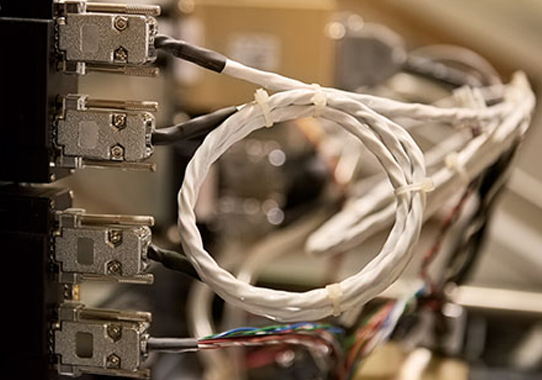FDH Electronics: Over 65 Years of Wire and Cable Manufacturing Expertise
At the forefront of the wire and cable manufacturing industry, FDH Electronics, through its subsidiary Whitmor/Wirenetics, provides exceptional capabilities to meet the diverse needs of its customers. From humble beginnings in 1959 as Whitmor, a cable manufacturer in North Hollywood, California, to its modern-day state-of-the-art facility in Valencia, California, Whitmor has continually evolved, solidifying its reputation as a leader in custom wire and cable solutions. Acquired by BJG Electronics Group in 2019 and now integrated into FDH Aero, the company offers unparalleled expertise and an extensive product range.
Comprehensive Custom Wire and Cable Solutions
FDH Electronics excels in designing and manufacturing custom wire and cable solutions tailored to specific customer requirements from being QPL’d on NEMA-WC2700-2020 to a complex multiconductor cable build with matched impedance. Whether it’s for general use or specialized high-temperature and harsh environments, FDH Electronics ensures customers’ visions become a reality. Our manufacturing capabilities extend from small prototype runs to high-volume production, ensuring flexibility and scalability.
FDH Electronics serves a broad range of industries, including:
-
- Military and Commercial Aerospace
- Space Exploration
- Medical Devices & Equipment
- Other Military Applications (Land Vehicle, Missile, Ground Support Equipment Etc..)
- Robotics
- Communications
- Magnet Wire and Precious Metals
- Test and Instrumentation
- Motorsports
Diverse Wire and Cable Product Offerings
FDH Electronics specializes in a wide variety of wire and cable products, ensuring every application is covered. These include:
-
- Primary Wires: Insulated copper & copper alloys for standalone hook-up wire or as sub-components for more complex cables.
- Data Cables: Coax, Twinax, Ethernet, Cat5/Cat6, USB/USB Micro, and FireWire – all with multiple construct options for the dielectrics, shield & jackets
- Twisted: Two or more insulated conductors twisted together, ideal for routing wires and saving space, this also reduces congestion.
- Homogeneous & Composite Cables: Cables made from multiple identical inner components or made with different sub-components
- Coil Cord Cables: Cables designed to expand and contract.
- Ribbon Cable: Multiple wires or sub-components lined up parallel to each other to form a cable that lies flat.
SPACE WIRE®
Since 1959, Whitmor/Wirenetics has served the Military, Aerospace, and Satellite markets as a leader in quality mil-spec wire, cable, and tubing products. As an ISO90001/AS9100 manufacturer, Whitmor/Wirenetics, an FDH Aero brand, offers a unique package of products and services, including harness components, mil-spec lightweight wire and cable, value-added services, and engineering support. SPACE WIRE®, from Whitmor/Wirenetics, addresses those markets’ concerns where weight & size savings and outgassing issues are the highest priority. SPACE WIRE® has been proven to perform under some of the most stringent requirements of the Space Industry. Use the quote form below to contact us for mil-spec lightweight wire and cable.
State-of-the-Art Wire and Cable Manufacturing

FDH Electronics employs advanced manufacturing techniques to deliver precision and quality. Our capabilities include:
-
- Extrusion Lines: High and low-temperature options with laser-guided precision.
- Braiding: Bare and plated copper & copper alloy wires, stainless steel, as well as mono & muti-filament textiles.
- Cabling: True planetary cabling with the capability of producing cables with 100 pairs or more, enabling less flex stress on the cables, and matched impedance constructions, where required.
- Taping: PTFE, polyimide, and mylar for isolating and jacketing, as well as a variety of foil composite tape for EMI & RFI shielding.
- Identification: Expansive capacity for ink striping on insulated wire and cable jackets, ink printing, and laser marking.
- Respooling and Inspection: 100% inspection ensures product integrity.
High-Performance Materials and Testing
FDH Electronics utilizes premium materials, including bare copper, high-strength alloys, and specialized coatings. These materials are tailored for applications requiring:
-
- High-temperature resistance
- Durability in extreme conditions
- Lightweight properties for aerospace and military use
Comprehensive electrical and mechanical testing capabilities include:
-
- High-voltage tests and spark testing in multiple departments
- WET/DRY dielectric withstand & impulse.
- Flexibility, flammability
- Cold bend, crush resistance, and elongation
- Impedance, Attenuations, Capacitance
Why Choose FDH Electronics?
With over five decades of experience, FDH Electronics has honed its expertise to deliver precision-engineered wire and cable solutions. Our commitment to quality, innovation, and customer satisfaction makes them a premier choice for businesses seeking reliable, high-performance products.
Whether you need a prototype for a groundbreaking project or large-scale production for established applications, FDH Electronics is your trusted partner. Contact us today to learn more about how their capabilities can transform your projects.



